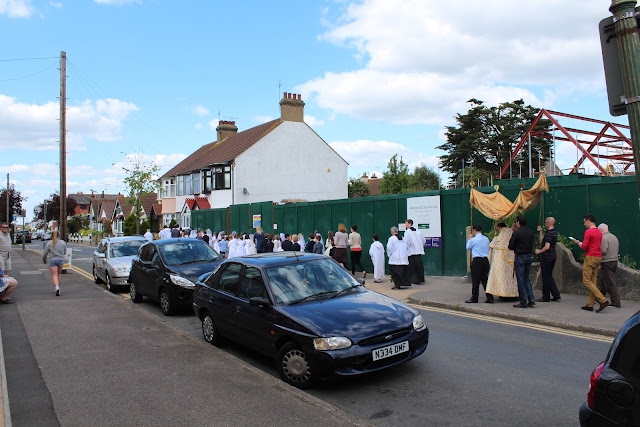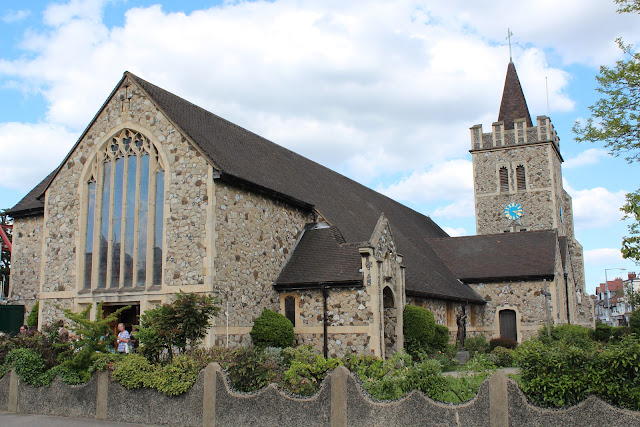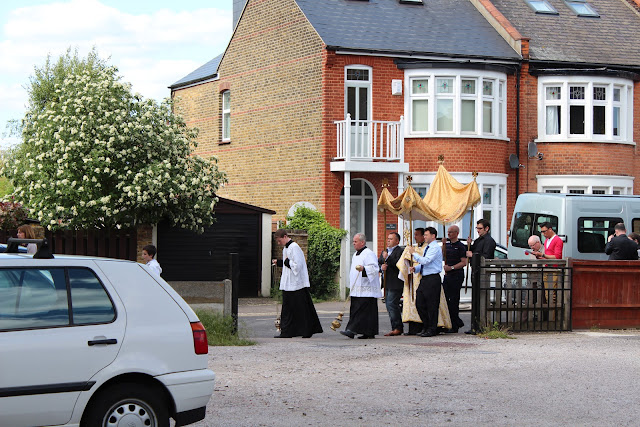Corpus Christi in Leigh-on-Sea
...And all around the world as Catholic's responded to the Pope's call to unite in an hour of Eucharistic Adoration today, the Feast of Corpus Christi, at 16:00 BST. Pope Francis led the unprecedented, worldwide event from Saint Peter’s Basilica in Rome. Catholic faithful throughout the world took part in their own Cathedrals and churches, and followed the event on television, radio, and the internet.
The Holy Father asked that this time of Eucharistic Adoration be offered especially for: For the Church spread throughout the world and united today in the adoration of the Most Holy Eucharist as a sign of unity: May the Lord make her ever more obedient to hearing his Word in order to stand before the world ‘ever more beautiful, without stain or blemish, but holy and blameless.’ That through her faithful announcement, the Word that saves may still resonate as the bearer of mercy and may increase love to give full meaning to pain and suffering, giving back joy and serenity.
For those around the world who still suffer slavery and who are victims of war, human trafficking, drug running, and slave labor. For the children and women who are suffering from every type of violence. May their silent scream for help be heard by a vigilant Church so that, gazing upon the crucified Christ, she may not forget the many brothers and sisters who are left at the mercy of violence. Also, for all those who find themselves in economically precarious situations, above all for the unemployed, the elderly, migrants, the homeless, prisoners, and those who experience marginalisation. That the Church’s prayer and its active nearness give them comfort and assistance in hope and strength and courage in defending human dignity.
We are very fortunate in Leigh-on-Sea to have our own procession each year, thanks to the dedication of our wonderful Parish Priest, Fr. Kevin Hale.
Fr. Kevin wrote some very important words in the newsletter this year which I would like to share with you:
So where does this tradition of processing through the streets with the blessed Sacrament come from?
Fr. Kevin wrote some very important words in the newsletter this year which I would like to share with you:
Dear Friends in Christ
In every Mass we hear the celebrant say immediately after the Consecration and Elevation: Mysterium fidei...The mystery of faith. These words evoke a response from us which are the very touchstone of the Christian Faith. In the Mass at that point we profess the presence of Jesus Christ really and truly present, Body, Blood, Soul, and Divinity. These are words to savour on this Solemnity of Corpus Christi. On this Day the Church wishes us to take joy and comfort from the abiding Presence of Our Lord in the Blessed Sacrament. In Rome our Holy Father, Pope Francis, will lead a special Holy Hour this Sunday afternoon to recall to the minds of all the Faithful the central importance of Eucharistic adoration in the life of the Church. This reminds us of those words of Saint Augustine [from the 5th Century] that ‘No one should receive Christ who has not first adored Him.’ We shall join with him in that adoration during our Eucharistic Procession this Sunday afternoon (at 4.00pm) which takes place at precisely the same hour as the Holy Father will be leading the prayer in St. Peter’s. Maybe we can all make the special effort required to attend, and so have an especially large gathering to give witness to our love of Jesus present with us in this Gift and Mystery.
Friday is the Solemnity of the Sacred Heart of Jesus and the annual day of Prayer for the Holiness of Priests. We gather with the Bishop on this day for a time of celebration of the priesthood; please unite in praying for us priests on Friday. There will be Exposition and Adoration of the Blessed Sacrament throughout the day following the Mass at the earlier time of 9:15am.
God Bless you all!
Fr. Kevin Hale.
So where does this tradition of processing through the streets with the blessed Sacrament come from?
"Very early (in the fourteenth century) the custom developed of carrying the Blessed Sacrament in a splendid procession through the town after the Mass on Corpus Christi Day. This was encouraged by the popes, some of whom granted special indulgences to all participants. The Council of Trent (1545-1563) solemnly approved and recommended the procession on Corpus Christi as a public profession of the Catholic faith in the real presence of Christ in the Holy Sacrament.
"During the later Middle Ages these processions developed into splendid pageants of devotion and honor to the Blessed Sacrament. They are still publicly held, and often with the ancient splendor, in Italy, France, Spain, Portugal, Austria, Belgium, Ireland, in the Catholic sections of Germany, Holland, Switzerland, Canada, Hungary, and in the Slavic countries and South America. Sovereigns and princes, presidents and ministers of the state, magistrates, members of trade and craft guilds, and honor guards of the armed forces accompany the liturgical procession while the church bells peal, bands play sacred hymns, and the faithful kneel in front of their homes to adore the Eucharistic Lord." — (Excerpted from Handbook of Christian Feasts and Customs, by Francis X. Weiser).
Here are some pictures from our wonderful Parish procession today (you sure do get some funny looks from people as you process past!)
"During the later Middle Ages these processions developed into splendid pageants of devotion and honor to the Blessed Sacrament. They are still publicly held, and often with the ancient splendor, in Italy, France, Spain, Portugal, Austria, Belgium, Ireland, in the Catholic sections of Germany, Holland, Switzerland, Canada, Hungary, and in the Slavic countries and South America. Sovereigns and princes, presidents and ministers of the state, magistrates, members of trade and craft guilds, and honor guards of the armed forces accompany the liturgical procession while the church bells peal, bands play sacred hymns, and the faithful kneel in front of their homes to adore the Eucharistic Lord." — (Excerpted from Handbook of Christian Feasts and Customs, by Francis X. Weiser).
Here are some pictures from our wonderful Parish procession today (you sure do get some funny looks from people as you process past!)
 |
| The First Holy Communion children all join in! |
 |
| We are accompanied by Tilbury Marching Brass |
 |
| The procession passes the skeletal evidence of our new parish centre as it rises slowly from behind the Church |
 |
| Past the Baptist church on the left |
 |
| Our Lady of Lourdes Leigh-on-Sea |
 |
| Along the main road in Leigh |
 |
| Back at the Church |
Here is the full text of Pope Francis’ homily from the Corpus Christi Mass, translated by Vatican Radio.
***
Dear brothers and sisters,
In the Gospel we have just heard, there is an expression of Jesus that always strikes me: “Give you them to eat. (Lk 9:13)” Starting from this sentence, I let myself be guided by three words: discipleship, fellowship and sharing.
1. First of all: who are those to whom we are to give to eat? The answer is found at the beginning of the Gospel: it is the crowd, the multitude. Jesus is in the midst of the people: He welcomes them, talks to them, He cures them, He shows them the mercy of God. In their midst, he chooses the twelve Apostles to be with Him, and like Him, to immerse themselves in the concrete situations of the world. People follow Him, listen to Him, because Jesus speaks and acts in a new way, with the authority of someone who is authentic and consistent, who speaks and acts with truth, who gives the hope that comes from God, who is revelation of the face of a God who is love - and the people with joy, bless God.
This evening we are the crowd of [which] the Gospel [tells]: let us also strive to follow Jesus to listen to him, to enter into communion with Him in the Eucharist, to accompany Him and in order that He accompany us. Let us ask ourselves: how do I follow Jesus? Jesus speaks in silence in the Mystery of the Eucharist and every time reminds us that to follow Him means to come out of ourselves and make of our own lives, not a possession, but a gift to Him and to others.
2. Let us take a step forward: whence is born the invitation that Jesus makes to his disciples to feed the multitude themselves? It is born from two elements: first, the crowd, having followed Jesus, now finds itself in the open, away from inhabited areas, as evening falls, and then, because of the concern of the disciples, who asked Jesus to dismiss the crowd, that they might seek food and lodging in the nearby towns (cf. Lk 9:12). Faced with the neediness of the crowd, the solution of the disciples is that every man should take care of himself: “Dismiss the crowd!” [the disciples say]. How many times do we Christians have this temptation! We do not care for the needs of others, dismissing them with a pitiful, “God help you.” Jesus’ solution, on the other hand, goes in another direction, a direction that surprises the disciples: [He says], “You give them something to eat.”
But how is it that we are to feed a multitude? “We have only five loaves and two fish, unless we go and buy food for all these people.” But Jesus is not discouraged. He asks the disciples to seat people in communities of fifty people, He raises his eyes to heaven, recites the blessing, breaks the loaves, and gives them to the disciples for distribution.
It is a moment of profound communion: the crowd, whose thirst has been quenched by the word of the Lord, is now nourished by His bread of life – and they all ate their fill, the Evangelist tells us.

Pope Francis holds a monstrance during the observance of the feast of Corpus Christi at the Basilica of St. Mary Major in Rome May 30. (CNS photo/Paul Haring)
This evening, we too are gathered around the Lord’s table, the table of the Eucharistic Sacrifice, in which He gives us once again His body, makes present the one sacrifice of the Cross. It is in listening to his Word, in nourishing ourselves with his Body and his Blood, that He makes us go from being a multitude to being a community, from [being strangers] to being [in] communion. The Eucharist is the sacrament of communion, which brings us out from individualism to live together our journey in His footsteps, our faith in Him. We ought, therefore, to ask ourselves before the Lord: How do I live the Eucharist? Do I live it anonymously or as a moment of true communion with the Lord, [and] also with many brothers and sisters who share this same table? How are our Eucharistic celebrations?
3. A final element: whence is born the multiplication of the loaves? The answer lies in the invitation of Jesus to his disciples: “You yourselves give [to them]...,” “give,” share. What do the disciples share? What little they have: five loaves and two fishes. But it is precisely those loaves and fishes that in God’s hands feed the whole crowd.
And it is the disciples, bewildered by the inability of their means, by the poverty of what they have at their disposal, who invite the people to sit down, and – trusting the Word of Jesus – distribute the loaves and fishes that feed the crowd. This tells us that in the Church, but also in society, a keyword that we need not fear is “solidarity,” that is, knowing how to place what we have at God’s disposal: our humble abilities, because [it is] only in the sharing, in the giving of them, that our lives will be fecund, will bear fruit. Solidarity: a word upon which the spirit of the world looks unkindly!
Tonight, once again, the Lord distributes for us the bread which is His body, He makes a gift of Himself. We, too, are experiencing the “solidarity of God” with man, a solidarity that never runs out, a solidarity that never ceases to amaze us: God draws near to us; in the sacrifice of the Cross He lowers Himself, entering into the darkness of death in order to give us His life, which overcomes evil, selfishness, death.
Jesus this evening gives Himself to us in the Eucharist, shares our same journey – indeed, He becomes food, real food that sustains our life even at times when the going is rough, when obstacles slow down our steps. The Lord in the Eucharist makes us follow His path, that of service, of sharing, of giving – and what little we have, what little we are, if shared, becomes wealth, because the power of God, which is that of love, descends into our poverty to transform it.
Let us ask ourselves this evening, adoring the Christ truly present in the Eucharist: do I let myself be transformed by Him? Do I let the Lord who gives Himself to me, guide me to come out more and more from my little fence, to get out and be not afraid to give, to share, to love Him and others?
Discipleship, communion and sharing. Let us pray that participation in the Eucharist move us always to follow the Lord every day, to be instruments of communion, to share with Him and with our neighbor who we are. Then our lives will be truly fruitful. Amen.





























Comments
Post a Comment